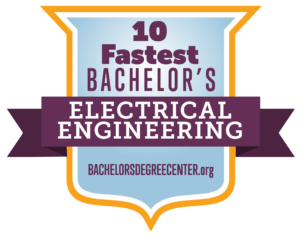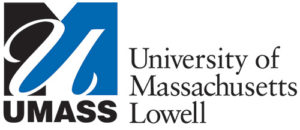
Key Information:
- American Public University is the #1 school for a fast online electrical engineering bachelor’s degree.
- Accelerated online programs allow students to graduate more quickly than traditional programs by taking more credits per term or during the summer.
- Online electrical engineering programs offer a challenging curriculum covering both core and advanced concepts in electrical engineering.
- Graduates are well-prepared for professional roles in the field due to the intensive nature of the programs.
An electrical engineering accelerated program refers to an academic course designed to teach students all the skills they need to handle advanced courses in the field, at a pace that is faster and more rigorous than traditional undergraduate programs. An accelerated electrical engineering degree can help you master the core and advanced concepts that are relevant to the field and prepare for more advanced degrees or professional positions. Accelerated electrical engineering programs are often rigorous and require discipline and hard work. Yet, they will prepare you for a rewarding career much faster than a normal program would take.
The major benefit of an electrical engineering accelerated program is that you can move through the program more quickly and often get all the core coursework done by what would be your junior year. Students can accomplish this by taking on additional credit hours during the semester or in an off-period like the summer. An accelerated electrical engineering degree is only suited for those who are looking to challenge themselves. But if you are interested in taking higher-level engineering courses or getting the coursework over with so you can look for employment opportunities, accelerated engineering programs allow you to do so without missing any important material.
Methodology: Ranking the Fastest Online Electrical Engineering Degree Programs
Bachelor’s Degree Center knows returning students want to get their degree quickly and conveniently, so our ranking of the best accelerated bachelor’s in electrical engineering gathers programs that offer a legitimate way to speed up the process. But because quality is also important, we rank only accredited programs according to data from Niche and IPEDS, including tuition rate, student reviews, and potential salary.
1. American Public University

American Public University has an accelerated electrical engineering degree with a generous transfer policy of 82%. Among the best accelerated electrical engineering programs, APU’s BS in Electrical Engineering produces individuals who can maintain engineering projects that involve highly skillful professionals. Students in this program receive a foundation in electrical engineering competency and practices.
APU is an online university run as a for-profit institution. Students apply as a formality since the college accepts 100% of those who want to go here. The most popular majors are liberal arts and humanities, business and Homeland Security.
What We Like: APU is West Virgina’s #4 best value college. Additionally, 94% of students say classes are highly available at the university.
Degree: BS in Electrical Engineering
American Public University BS in Electrical Engineering
2. University of Massachusetts Lowell

One of the best accelerated electrical engineering degree options is offered by the University of Massachusetts Lowell. This is one of the most flexible accelerated electrical engineering programs since the college accepts up to 90 transfer credits. The BS in Electronic Engineering Technology prepares graduates to take on jobs and consumer electronics, semiconductors, telecommunications and related fields. The program focuses on the design, testing and production of hardware and software. Student study computer science and math and apply this knowledge to electrical circuit problems.
Founded in Lowell, Massachusetts, the school lies 25 miles from the bustle of Boston. This location in the technology corridor offers all students an opportunity for co-ops and internships during and after their studies.
What We Like: The school accepts more than seven out of 10 students and 90% of students receive some form of financial aid.
Degree: BS in Electronic Engineering Technology
University of Massachusetts Lowell BS in Electronic Engineering Technology
3. National University

National University’s accelerated electrical engineering degree teaches students how to resolve electrical engineering problems through the use of computer technology. One of the best accelerated electrical engineering programs, the program focuses on the importance of clean computer engineering and the relationship between software and hardware. Students learn about embedded systems and devices such as digital audio players, cell phones, alarm systems, digital video recorders and laser tools for surgery. With an emphasis on analytical thinking, the program helps students learn the elements of design and go on to pursue jobs in electrical engineering.
National University has 7,400 students and dates back to 1971. This private institution has a rolling admissions policy and continuous academic calendar.
What We Like: The generous transfer policy makes it easier for students who have already begun their education elsewhere to complete their degree quickly.
Degree: BS in Electrical and Computer Engineering
National University BS in Electrical and Computer Engineering
4. Old Dominion University

Old Dominion University offers an accelerated electrical engineering degree which accepts many credits from other universities. As one of the country’s top accelerated electrical engineering programs, this degree focuses on designing computer systems for modern life. Graduates emerge as computer engineers and take on jobs that require deep knowledge of how software and hardware components interact. Courses include data structures, programming, advanced circuit analysis, system design, and digital electronics. The program also covers ethical and leadership concepts related to electrical engineering. Graduates emerge ready to sit for Virginia’s Fundamentals of Engineering (FE) exam.
Old Dominion is a highly regarded university open the public admission. It is based in Norfolk, Virginia. With nearly 15,000 undergraduate students, the school has a reputation that surpasses regional and national boundaries. Old Dominion accepts nearly nine out of 10 students who apply. Although it offers dozens and dozens of majors, the most popular are psychology and criminology.
What We Like: Students who enroll in Old Dominion can take classes entirely online and the school ranks number 54 among the nation’s best online colleges.
Degree: Electrical Engineering Technology
Old Dominion University Electrical Engineering Technology
5. Thomas Edison State University

Like many accelerated electrical engineering degrees, the program at Thomas Edison State University has a generous transfer policy. It is one of the country’s best accelerated electrical engineering programs and graduates receive a BS in Electronics Systems Engineering Technology. Students prepare to become technologists and master concepts that help them succeed in the electronics industry. Courses include avionics, computer hardware, communications and instrumentation. Higher-level courses are required for graduation and students need 124 credits to complete the degree.
Thomas Edison State University is a small university based out of Trenton, NJ. The generous acceptance rate of the university means that everyone who applies as an opportunity to pursue their undergraduate degree. Other popular majors include business and nursing.
What We Like: Everyone who applies is accepted and more than four out of five students say that it’s easy to get the classes they need for graduation.
Degree: Electronics Systems Engineering Technology
Thomas Edison State University Electronics Systems Engineering Technology
6. Southern Illinois University Carbondale

Southern Illinois University Carbondale’s accelerated electrical engineering degree can be completed 100% online. Like many accelerated electrical engineering programs, SIUC accepts a number of transfer credits from other accredited universities. This well-rounded degree prepares students to complete their Bachelor of Science in electrical engineering. Graduates have mastered fundamental skills and knowledge needed to become field service engineers, electronic design engineers, senior engineer technicians and similar roles. Courses available in this program include electrical power distribution, computer systems, microelectronics and electives.
Southern Illinois Carbondale is open to the public. Considered a midsize school, Southern Illinois Carbondale has over 7,000 students. It’s relatively difficult to get into the school since the admissions board accepts just two out of three students who apply. Students who do get accepted have a large ledger of majors to choose from it and some choose to study education, manufacturing engineering or electrical engineering.
What We Like: Nearly four out of five students graduate confident that they will find jobs in their field.
Degree: Electrical Engineering Technology
Southern Illinois University Carbondale Electrical Engineering Technology
7. Siena Heights University

Siena Heights University offers online degrees and has a generous transfer policy for programs such as the accelerated electrical engineering degree. As one of the country’s top accelerated electrical engineering programs, SHU has been training engineers since 1975. This program is aggressively focused on obtaining future employment and the curriculum covers public safety, allied health, and specialized occupational backgrounds related to electronic engineering.
Siena Heights is based in Adrian, Michigan, and was founded as a private catholic school. The small college has fewer than 3,000 undergraduate students enrolled. It’s relatively competitive to get into Siena Heights and the school accepts just 73% of applicants. Among its many majors, business and criminal justice are among the most popular.
What We Like: Nearly all students who attend this college receive some form of financial aid, making it more affordable than similar schools with less generous financial aid statistics.
Degree: BAS in Electronics Technology
Siena Heights University BAS in Electronics Technology
8. Grantham University

Grantham University has an accelerated electrical engineering degree which students can complete in 38 months. Among accelerated electrical engineering programs, this is one of the best. Graduates obtain an electronics engineering technology degree that gives them the skills and knowledge needed to pursue entry-level jobs in electronics. Some students go on to complete a master’s degree. Foundational coursework includes digital and analog electronics, circuit theory, and microprocessor concepts.
Grantham University is a fully accredited university that seeks to give every student a high-quality and flexible experience. Those accepted into the school choose from more than 60 degrees and certificate options. Grantham focuses on preparing students to enter the workforce or continue their studies in fields such as nursing, computer science, and business.
What We Like: Grantham University accepts every student who applies, and 99% of those who decide to pursue a degree here receive some kind of financial aid.
Degree: Electronics Engineering Technology
Grantham University Electronics Engineering Technology
9. SUNY Canton

SUNY Canton has an accelerated electrical engineering degree that students can take entirely online. It stands out as one of the best accelerated electrical engineering programs in the country. The program prepares students to develop, design, and test electrical equipment. Graduates become technologists who can test and evaluate electronic equipment and perform necessary repairs. Courses in the program include electrical power, electronics, telecommunications, and microprocessors. Students completed capstone project that prepares them to solve real-world problems.
SUNY Canton has fewer than 2,800 undergraduate enrollees. This public school accepts 85% of those who apply. Some of the majors offered include liberal arts and humanities and veterinary technician studies.
What We Like: It’s relatively easy to get into the school and 95% of those who study here receive financial aid.
Degree: BTech in Electrical Engineering Technology
SUNY Canton BTech in Electrical Engineering Technology
10. Excelsior College

At Excelsior College, students can complete an accelerated electrical engineering degree. One of the best accelerated electrical engineering programs, this degree accepts up to 117 online transfer credits. Students who complete the requirements for this BS in electrical engineering technology emerge prepared to take on entry roles in the field. Students can receive transfer credit for past experience in the military and other jobs. This unique program allows students to build on their life experience to complete their education more quickly.
Excelsior allows students to complete their degrees 100% online. It also accepts everyone who applies. Some of the most popular majors include nursing and business.
What We Like: Of those surveyed, 82% of students say it’s easy to get the classes they need and want.
Degree: BS in Electrical Engineering Technology
Excelsior College BS in Electrical Engineering Technology
What is Electronics Engineering?
If you are just now looking at your options, you may be wondering what is electronics engineering? The answer is that it’s the discipline that designs electronic circuits, devices, integrated circuits, and their systems. These circuits are used in much of the technology that helps us live our daily lives – from computers to televisions to smartphones. There are many different ways you can answer the question of what is electronics engineering? Engineers often perform many roles and are responsible for designing, testing, and improving the electrical systems needed for society to function.
To better understand the question of what is the job of an electronics engineer? You first must answer the question of what is electronics engineering technology? Electronics engineering technology is the study of how to design and build both analog and digital electronic systems. The job of an electrical engineer is to design, develop, test, and supervise the manufacture of electrical equipment.
If you’re asking yourself what is electronics engineering technology? Or what is the job of an electronics engineer? Just take a look at a few household electronics in your home. If you look closely, you will see that these products are made up of different circuits, wires, and other instruments that conduct electricity and send communications. The job of an electronics engineer is to develop these systems and ensure that they function properly.
What is the Difference Between an Electronics Engineer an Electrical Engineer?
The electrical engineer vs electronics engineer debate is subtle, yet important. You may be debating electronics vs electrical engineering if you are looking at a master’s program and it’s important to weigh your options before making any commitments. Electrical engineering refers to a broader field that encompasses multiple areas of study including electronics engineering. Electronics engineering focuses specifically on the development of electronic devices whereas electrical engineering encompasses a wider range of fields such as power systems, signal processing, and communications.
So, comparing an electrical engineer vs electronics engineer is somewhat like comparing the relationship between a square and a rectangle – all electronics engineers are electrical engineers but not vice versa.
If you are debating electronics engineering vs electrical engineering, it’s important to weigh the pros and cons. Electronics engineering is an exciting and dynamic field, but it’s also quite rigorous and competitive, meaning you have to be committed. There are plenty of other fields of electrical engineering you may consider if you are interested in the field, but not necessarily working with electronics specifically.
You may also be debating the electronics engineer vs electrical engineer salary if you are considering either field. The truth is that their pay is roughly the same. The average salary for an electronics engineer vs electrical engineer is $74, 785 to $76,840. More electrical engineering jobs available because it’s a broader discipline, so the figure is slightly lower, but on average the salary is similar.
When considering electronics vs electrical engineering, it’s important to take stock of your own career goals. If you’re fascinated by electronics and want to learn to make faster, more efficient consumer products and IT, then electronics engineering may be right up your alley. But, if you aren’t quite sure what you want to pursue and would rather see what piques your interest, it may make sense to start out with electrical engineering and specialize later on. When considering whether you want to become an electronics engineer vs an electrical engineer, it’s best to trust your gut. Both offer exciting job opportunities with competitive salaries and the opportunity to work on projects that could transform the world. But both are disciplines that require technical know-how and dedication to the field. When weighing the pros and cons of electronics engineer vs electrical engineer, it’s important to take stock of what you are good at and passionate about, so you don’t get in over your head.
What About Online Electrical Engineering Degrees?
There are many online programs for full-time students who want to work in electrical engineering. Be sure when you are looking at programs that they have accreditation from the Accreditation Board for Engineering and Technology (ABET). ABET-accredited programs are the highest quality. Right out of high school many students want a traditional on-campus program, but working adults can keep their jobs as online students.
The admission requirements for enrollment (such as GPA) may be lower for online engineering students. In-state learners have an advantage in-person, but online tuition is often the same. Schools like Arizona State University (ASU) charge the same for out-of-state and in-state online students.
Online courses can help students develop the same problem-solving and critical thinking skills as an on-campus course. Plus, most online schools use the same faculty members as on-campus. Prospective students may have to meet some prerequisite requirements, and online programs might not offer all specializations to transfer students.
There are many branches and career paths in the engineering field, and professionals with an electrical engineering bachelor’s degree have a place in all of them:
- electromagnetics
- energy systems
- control systems
- robotics
- aerospace
- bioengineering
- engineering design
- nanotechnology
- computer programming
- communications systems
The Bureau of Labor Statistics shows that we will likely never have enough professionals to meet demand for engineering careers!
Related Rankings:
25 Best Bachelor’s in Electrical Engineering
15 Best Online Bachelor’s in Electrical Engineering
10 Most Affordable Bachelor’s in Electrical Engineering
